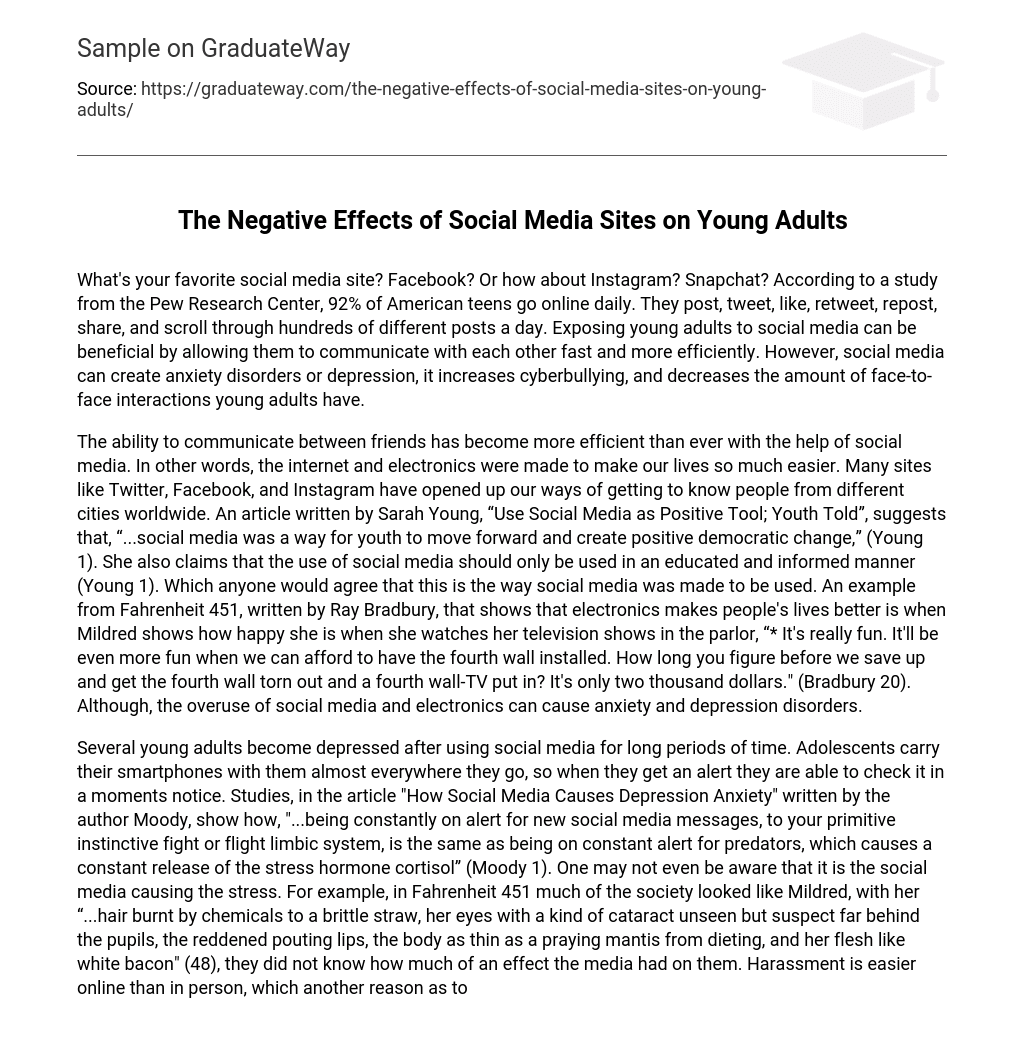What’s your favorite social media site? Facebook? Or how about Instagram? Snapchat? According to a study from the Pew Research Center, 92% of American teens go online daily. They post, tweet, like, retweet, repost, share, and scroll through hundreds of different posts a day. Exposing young adults to social media can be beneficial by allowing them to communicate with each other fast and more efficiently. However, social media can create anxiety disorders or depression, it increases cyberbullying, and decreases the amount of face-to-face interactions young adults have.
The ability to communicate between friends has become more efficient than ever with the help of social media. In other words, the internet and electronics were made to make our lives so much easier. Many sites like Twitter, Facebook, and Instagram have opened up our ways of getting to know people from different cities worldwide. An article written by Sarah Young, “Use Social Media as Positive Tool; Youth Told”, suggests that, “…social media was a way for youth to move forward and create positive democratic change,” (Young 1). She also claims that the use of social media should only be used in an educated and informed manner (Young 1). Which anyone would agree that this is the way social media was made to be used. An example from Fahrenheit 451, written by Ray Bradbury, that shows that electronics makes people’s lives better is when Mildred shows how happy she is when she watches her television shows in the parlor, “* It’s really fun. It’ll be even more fun when we can afford to have the fourth wall installed. How long you figure before we save up and get the fourth wall torn out and a fourth wall-TV put in? It’s only two thousand dollars.” (Bradbury 20). Although, the overuse of social media and electronics can cause anxiety and depression disorders.
Several young adults become depressed after using social media for long periods of time. Adolescents carry their smartphones with them almost everywhere they go, so when they get an alert they are able to check it in a moments notice. Studies, in the article “How Social Media Causes Depression Anxiety” written by the author Moody, show how, “…being constantly on alert for new social media messages, to your primitive instinctive fight or flight limbic system, is the same as being on constant alert for predators, which causes a constant release of the stress hormone cortisol” (Moody 1). One may not even be aware that it is the social media causing the stress. For example, in Fahrenheit 451 much of the society looked like Mildred, with her “…hair burnt by chemicals to a brittle straw, her eyes with a kind of cataract unseen but suspect far behind the pupils, the reddened pouting lips, the body as thin as a praying mantis from dieting, and her flesh like white bacon” (48), they did not know how much of an effect the media had on them. Harassment is easier online than in person, which another reason as to why social media causes depression.
Young adults should not be exposed to social media because it provides an easier way to torment one another. Cyberbullying is the practice of bullying a person over technology, usually practiced by people who are overly attached to their electronic devices. The novel, Fahrenheit 451, demonstrates an attachment to electronics with Mildred. “She was an expert at lip reading from ten years of apprenticeship at Seashell ear thimbles,” (18), this quote describes how Mildred has been attached to her ear-buds for ten years. A recent study conducted by an Australian Psychologist, Sheryl A. Hemphill, shows that cyber-bullying in the seventh grade was s due to family issues (Hemphill 1). Family attachment and emotional control are statistically significant in cyber bullying (1). Many of these incidents have also occurred in other countries including Canada, Japan, Scandinavia, and the United Kingdom, as well as New Zealand (68). Surveys conducted by several psychologists, in the article, “Cyberbullying: Youngsters Experiences and Parental Perception” by Francine Dehue, Catherine Bolman, and Trijntje Völlink, provide results that about 16% of secondary school students have engaged in cyberbullying via the Internet, while about 23% were victims of cyberbullying (Dehue, Bolman, Völlink 1). Young adults who grow up exposed to social media have a higher risk of being involved in cyberbullying which is why parents should restrict the use of it. Aside from increasing involvement in cyberbullying, social media decreases the face-to-face interactions that young adults have.
Young adults who are exposed to social media at an early age suffer from face-to-face interactions with their peers. Children are now communicating with their parents, “…through social network sites, according to a new report out today,” an article from dailymail.com claims.. If you walk into a restaurant there will most likely be several people with their heads down looking at their smart phones, social media has become the top way people communicate with each other. Much like in Fahrenheit 451, friends now go to each others houses just to watch movies or to be on social media together (93). Rather than craving the want of making up jokes or playing board games with one another, young adults now show each other vines or snapchats to make each other smile.
With the use of social media increasing and the creation of social sites developing, it is difficult to prevent young adults to use it. Many sites suggest numerous ways that parents can do to keep their kids off the internet and electronics and to engage in the society through sports and other activities. Although, when young adults are not prevented from using social media they are at risk of having anxiety or depression disorders, being involved in cyberbullying, and being less interactive with their peers.





